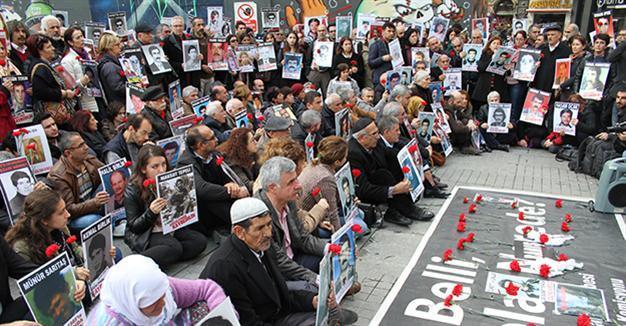UN group on enforced disappearances to visit Turkey for first time in almost two decades
GENEVA/ANKARA

The Saturday Mothers, who have gathered every Saturday in front of the Galatasaray High School on Istanbul’s central İstiklal Avenue since the mid-1990s, carry posters of missing family members who have disappeared after being detained by security forces, or who have died in unsolved murders. Cihan Photo
A delegation of the United Nations Working Group on Enforced or Involuntary Disappearances will pay an official visit to Turkey next week in order to study measures adopted by the government to counter enforced disappearances.The delegation, a body working under the Office of the United Nations High Commissioner for Human Rights (OHCHR), will be in Turkey on March 14-18 at the invitation of Ankara. The same group’s most recent visit to Turkey took place almost two decades ago in 1998.
The group is expected to travel to Ankara, Istanbul and Diyarbakır, where they will meet with state officials as well as relatives of disappeared people and representatives of civil society organizations. A final report on the trip examining issues related to truth, justice and reparation for the victims is expected to be presented to the U.N. Human Rights Council in September 2016.
The Working Group was established by the U.N. Commission on Human Rights in 1980 to assist families in determining the fate and whereabouts of disappeared relatives. It endeavors to establish a channel of communication between the families and the governments concerned, to ensure that individual cases are investigated, with the objective of clarifying the whereabouts of persons who, having disappeared, are placed outside the protection of the law.
Approached by the Hürriyet Daily News on March 11, Turkish officials declined to comment on the reasons behind the visit taking place at this point.
In the two decades after the Sept. 12, 1980 military coup, when the Working Group’s first visit to Turkey took place, serious human rights violations including killings, disappearances, and torture, were committed against civilians in the predominantly Kurdish-populated southeastern Anatolia, amid clashes between the state and the armed outlawed Kurdistan Workers’ Party (PKK).
The Working Group’s upcoming visit comes at a time of rising tension in the southeast, which has been hit by the worst violence in years, shattering a fragile peace process after a two-and-a-half-year de facto ceasefire in July 2015.
















